Divine Liturgy in Star Dojran ( 02.08.2009 )
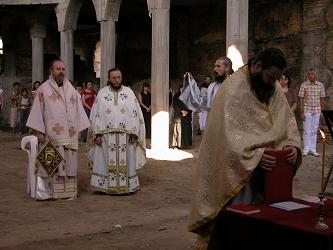
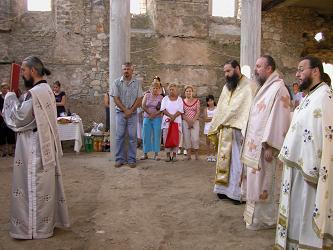
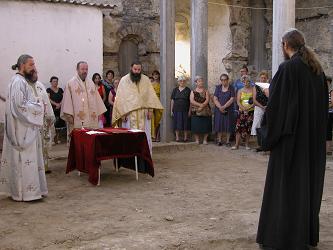
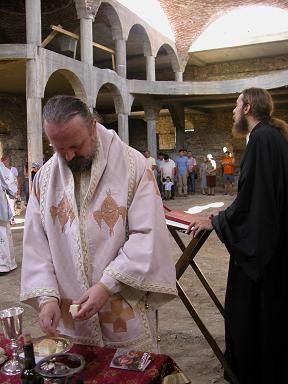
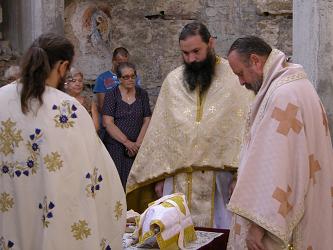
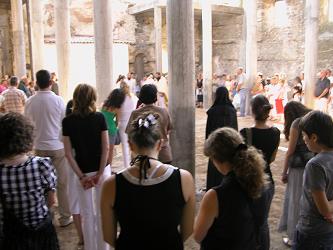
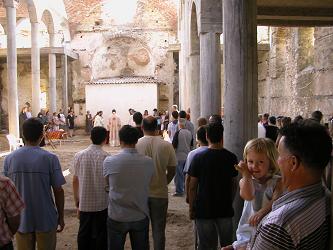

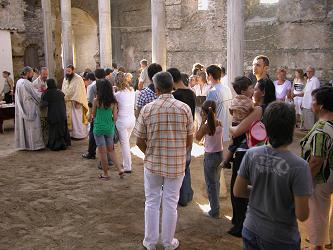
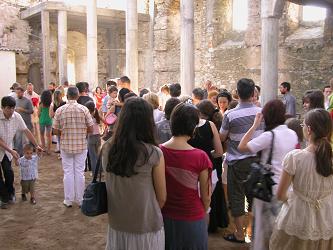
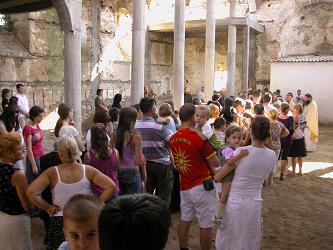
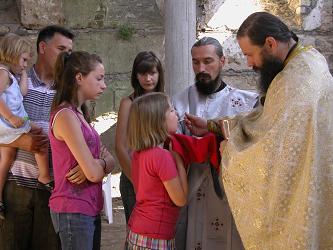
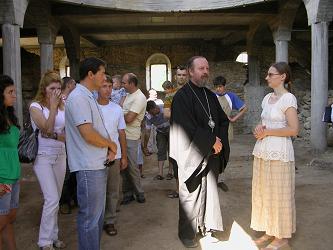
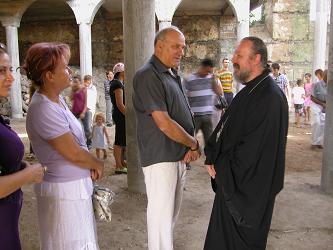
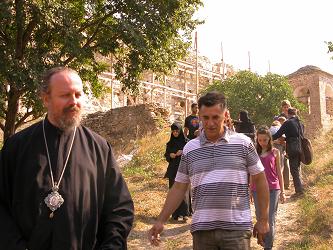
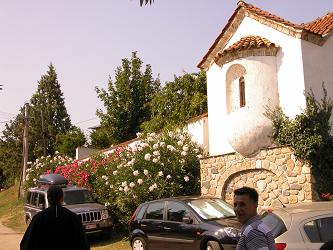
No Prophet Is Accepted in His Own Country
So all bore witness to Him, and marveled at the gracious words which proceeded out of His mouth. And they said, “Is this not Joseph’s son?”
He said to them, “You will surely say this proverb to Me, ‘Physician, heal yourself! Whatever we have heard done in Capernaum, do also here in Your country.’” Then He said, “Assuredly, I say to you, no prophet is accepted in his own country.
But I tell you truly, many widows were in Israel in the days of Elijah, when the heaven was shut up three years and six months, and there was a great famine throughout all the land; but to none of them was Elijah sent except to Zarephath, in the region of Sidon, to a woman who was a widow. And many lepers were in Israel in the time of Elisha the prophet, and none of them was cleansed except Naaman the Syrian.”
So all those in the synagogue, when they heard these things, were filled with wrath, and rose up and thrust Him out of the city; and they led Him to the brow of the hill on which their city was built, that they might throw Him down over the cliff. Then passing through the midst of them, He went His way (Luke 4:22-30).
It is usual for someone who has no personal experience in repentance, someone who holds fast to this world not to believe in his fellowman’s repentance either. Mainly because of the disbelief of His fellow-countrymen the Godman Jesus Christ did not perform many miracles in His native place.
What does personal experience in repentance conditionally mean? We say conditionally since, firstly, repentance has no end for us in such a world and in this age. Also since, secondly, I wish to emphasize that there is a special goal of the repentance at each of the stages of spiritual development respectively. Thus, personal experience in repentance at the first stage is the completed process of purification of the heart from passions. Repentance at the first stage of spiritual development is completed with the heart’s opening, with the revelation of the place of the heart, with the gift of the mind-and-heart prayer, with the ascetical union of the energy and the essence of the mind, and with the beginning of the process of illumination of the mind. All I have just listed is encompassed with and implied in the phrase “change of mind”. The original Greek word μετάνοια that we translate as “repentance” in fact literally means “change of mind”. There is no better expression by which we could encompass and describe the process in which, aided by God’s grace, our mind turns from proud, distracted, and darkened into humble, prayerfully collected in the heart, and illumined.
Also, we can count as personal experience in repentance the real experience acquired in obedience, in the process of purification of the heart from passions. It is much important for us that we can perceive the first fruits of the experience in repentance, of Orthodox spiritual life, and that this additionally motivates us in the struggle. For instance, if we already notice the fruits of the first beholding of uncreated light i.e. of the purification of the mind’s energy, then we can sense what the fruits will be like of the purification of the mind’s essence. Or, for instance, if it is so beautiful to us in the period when we receive the first grace, which afterwards hides itself from us, how much will we then have permanent consolation and light from the grace of illumination, which relatively constantly abides with the ones who have received it as a gift. Experience is a great support and impetus for every ascetic, both when grace openly helps him and when it hides itself. Since we have a spiritual father who vigilantly watches our struggle and since we have knowledge that stems from experience, we can more securely move in the direction of conquering new inner spiritual areas that are revealed to us through the eyes of faith. Yet, as I said, the one who has no personal experience in repentance will hardly believe in his fellowman’s repentance.
Let us now leave aside them who do not believe and turn our attention to them who say they believe and yet have no personal experience in repentance. Troubles in the Church arise from them.
Although he may even call himself a Christian, one who has no personal experience still does not recognize the fruits of repentance and the road to them. The arbitrary and undefined spiritual life that is in line with our great idea of ourselves, with our pride and vanity, is particularly characteristic of the world in which we live. The undefined and foggy general understanding of spiritual life is an excellent atmosphere where our individual spiritual poverty can hide itself; and this suits many. Moreover, not only it can hide but by means of special clothes or the priestly ranks or the observing of some outward church order or with one’s own intelligence and various titles, spiritual blind people manage even to promote themselves personally as virtuous and exemplary. Rare are they who walk the narrow road. Following Christ and witnessing to Christ in this world demands much self-sacrifice and much self-denial. Therefore, rare are they who want to check their spiritual life by the Patristic description of the stages of spiritual development, the description that we now have collected and systematized—because they will have to change it.
Everyone who struggles properly spiritually and desires to remain in this struggle, constantly examines himself in the light of the Holy Fathers’ tradition. And, contrary to this, they who desire, consciously or unconsciously, only to improvise and imitate spiritual life and at the same time remain bound by passions, neither examine themselves nor wish to know there are certain order and harmony in spiritual development; for, the light of the Tradition exposes such ones. Moreover, they personally bring themselves to the point of hating that light: “The light has come into the world, and men loved darkness rather than light, because their deeds were evil. For everyone practicing evil hates the light and does not come to the light, lest his deeds should be exposed. But he who does the truth comes to the light, that his deeds may be clearly seen, that they have been done in God” (John 3:19-21). Hence, there are many who do not recognize the fruits of repentance and the road to them either, because they continuously self-satisfy themselves with false spiritual life and the delusion under which they are.
He who has no personal experience in repentance not only does not recognize the repentance in his fellowman but, moreover, he is, to put it most mildly, bothered by such experience in his fellowman. He is bothered because always, to be brief, on the one hand the Patristic model reveals how one should live godly in the Church, and on the other hand it reveals how one should not. There is perhaps not a critical mass of people that can recognize this consciously, yet there is always a critical mass that can sense this: “Look, the world has gone after Him!” (John 12:19). Vanity, because of the fond hope for human glory, in them who count themselves a spiritual grandeur, is greatest. Their vanity is either satisfied with the gain of human glory or hurt with its loss. Is it clear to you now why we easily accept and praise the saints’ repentance, of which we read in their Lives from this time distance, while we do not do this with our fellowman’s, our contemporary’s repentance?! Or why we accept and praise the spiritual grandeur of them who live far from us in terms of space (Russia, Serbia, Mount Athos), while we do not do this with the spiritual grandeur of our fellowman who lives with us?! For these same reasons, no prophet is accepted in his own country.
We are all victims of vanity, more or less. On the one hand, we think we know people—“Is this not Joseph’s son?”—and we can easily judge them. On the other hand, we forget that the sin we “recognize” in our fellowman, according to the Holy Fathers, exists in us as well. Therefore does Christ say, “With what judgment you judge, you will be judged” (Matthew 7:2). We even judge our fellowman according to what we personally see as a sin: “How is it that He eats and drinks with tax collectors and sinners?” (Mark 2:16). We tend to estimate and judge a man by his assumed or really committed sin sooner than value him by his repentance. If this judgment of ours for any man is a final one, it is a definite sign that we have no experience in repentance. We live as though we can hardly wait for some of them who bother our vanity to make some mistake, according to God’s law or according to our own criteria. We even want to believe in his ostensible sins and falls, and we consider our friend the one who carries or creates such false information for the sake of ingratiation and self-promotion.
The prophet cannot be our enemy but only a friend. The true enemy of our soul is the false witness. He will darken our soul and our mind through the evil thoughts against the prophet whenever we trust him; and he will constantly try to deceive us, all until he achieves his goal (or until he repents). However, whether, or when, the prophet will be killed, does not depend on the false witnesses and on them who wish he was gone, but on God: So all those in the synagogue, when they heard these things, were filled with wrath, and rose up and thrust Him out of the city; and they led Him to the brow of the hill on which their city was built, that they might throw Him down over the cliff. Then passing through the midst of them, He went His way. Likewise, the holy prophet Elijah, for instance, was not murdered by his contemporaries, on the contrary…
Whenever we act by the commandment of love, we will justify our fellowman and find the guilt in ourselves. When we do not act by the commandment of love, we will always justify ourselves and find the guilt in our fellowman. We should ask ourselves whether our fellowman—every single person that we meet daily in our life—is not one prophet sent for us by God, who foretells us our future depending on our attitude towards him. And the true prophet of God, whatever he may do, will hardly open to mercy the vain hearts of the self-proclaimed spiritual grandeurs: “For John the Baptist came neither eating bread nor drinking wine, and you say, ‘He has a demon.’ The Son of Man has come eating and drinking, and you say, ‘Look, a glutton and a winebibber, a friend of tax collectors and sinners!’” (Luke 7:33-34).
Children, today’s Gospel reading is a nice lesson and reminder for us not to hope much on our Christian or monastic name, but rather to endeavor to show Christian or monastic works, because, many widows were in Israel in the days of Elijah, and many lepers were in Israel in the time of Elisha the prophet… And because, he is not a Jew who is one outwardly, nor is circumcision that which is outward in the flesh; but he is a Jew who is one inwardly; and circumcision is that of the heart, in the Spirit, not in the letter; whose praise is not from men but from God (Rom. 2:28-29).
Holy Prophets of God, pray to the Lord for us…!
Metropolitan Nahum of Strumica